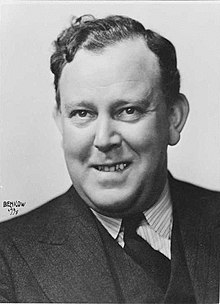Trygve Lie
| Trygve Lie | |
|---|---|

Trygve Lie in 1938
|
|
| 1st Secretary-General of the United Nations | |
|
In office 2 February 1946 – 10 November 1952 |
|
| Preceded by | Gladwyn Jebb (acting) |
| Succeeded by | Dag Hammarskjöld |
| Minister of Foreign Affairs | |
|
In office 19 November 1940 – 2 February 1946 |
|
| Monarch | Haakon VII |
| Prime Minister |
Johan Nygaardsvold Einar Gerhardsen |
| Preceded by | Halvdan Koht |
| Succeeded by | Halvard Lange |
| Personal details | |
| Born |
Trygve Halvdan Lie 16 July 1896 Oslo, Norway, United Kingdoms of Sweden and Norway |
| Died | 30 December 1968 (aged 72) Geilo, Norway |
| Nationality | Norwegian |
| Political party | Norwegian Labour Party |
| Children | Sissel, Guri, Mette |
| Religion | Lutheran/Church of Norway |
| Signature |  |
Trygve Halvdan Lie (Norwegian pronunciation: [ˌtɾyɡʋə ˈliː] (![]() listen); 16 July 1896 – 30 December 1968) was a Norwegian politician, labour leader, government official and author. He served as Norwegian Foreign minister during the critical years of the Norwegian government in exile in London from 1940 to 1945. From 1946 to 1952 he was the first Secretary-General of the United Nations. Lie earned a reputation as a pragmatic, determined politician.
listen); 16 July 1896 – 30 December 1968) was a Norwegian politician, labour leader, government official and author. He served as Norwegian Foreign minister during the critical years of the Norwegian government in exile in London from 1940 to 1945. From 1946 to 1952 he was the first Secretary-General of the United Nations. Lie earned a reputation as a pragmatic, determined politician.
Lie was born in Kristiania on 16 July 1896. His father, carpenter Martin Lie, left the family to emigrate to the United States in 1902, never to be heard from again. Trygve grew up under poor conditions together with his mother Hulda and a six-year-old sister. His mother ran a boarding house and café in Grorud in Oslo.
Lie joined the Labour Party in 1911 and was named as the party's national secretary soon after receiving his law degree from the University of Oslo in 1919. Lie was editor-in-chief for Det 20de Aarhundre ('The 20th Century') from 1919 to 1921. From 1922 to 1935 he was a legal consultant for the Workers' National Trade Union (named Norwegian Confederation of Trade Unions from 1957). He chaired the Norwegian Workers' Confederation of Sports from 1931 to 1935.
...
Wikipedia
